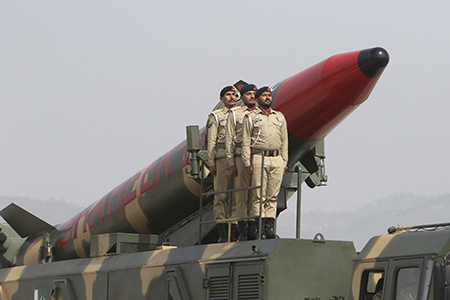U.S. Says Pakistan Developing Long-Range Missiles
January/February 2025
By Kelsey Davenport and Daryl G. Kimball
The United States accused Pakistan of developing long-range ballistic missiles and announced new sanctions on four Pakistani entities involved with the development of those systems.

U.S. Deputy National Security Advisor Jon Finer said Pakistan is pursuing “increasingly sophisticated missile technology,” including long-range ballistic missiles and large rocket motors that could eventually enable the country to “strike targets well beyond South Asia, including the United States.”
In a Dec. 19 speech sponsored by the Carnegie Endowment for International Peace and the Arms Control Association, Finer described Pakistan’s missile activity as an “emerging threat to the United States.”
In a Jan. 3 briefing for nongovernmental experts, senior U.S. officials, speaking anonymously, said that Pakistan’s capability to field long-range ballistic missiles is “several years to a decade” away and is part of an ongoing effort dating back several years to increase the range and throw-weight capabilities of the country’s ballistic missiles.
The Pakistani Foreign Ministry did not confirm or deny that the country was developing long-range missiles in a statement issued Dec. 19. The statement said Pakistan’s strategic capabilities are “meant to defend its sovereignty and preserve peace and stability in South Asia.”
The senior U.S. officials also revealed at the Jan. 3 briefing that, to address U.S. concerns, Washington had proposed several “basic” confidence-building measures to Islamabad, including sharing telemetry information on Pakistani ballistic missile testing and setting limits on the outside ranges to which Pakistan would test its ballistic missiles. These ideas “were rejected” by Pakistani interlocutors, the U.S. officials said.
The day before Finer’s speech, the U.S. State Department announced sanctions on four entities under an executive order that allows the president to target proliferators of weapons of mass destruction and their delivery systems. One of the entities, the National Development Complex, is “responsible for Pakistan’s development of ballistic missiles,” according to the announcement. The three other entities were targeted for supplying the National Development Complex with equipment relevant to missile development. This is the first time that the United States has sanctioned a Pakistani state-owned entity involved in missile development, Finer said.
Earlier this year, the United States also announced sanctions against commercial entities in Belarus, China, and Pakistan that “have supplied missile-applicable items to Pakistan’s ballistic missile program, including its long-range missile program.”
The foreign ministry statement said that the U.S. imposition of “sanctions defies the objective of peace and security by aiming to accentuate military asymmetries.” It accused the United States of engaging in “discriminatory practices” that undermine the nonproliferation regime.
Long-range ballistic missiles generally are defined as having a range greater than 3,500 kilometers and are used to deliver nuclear warheads. Pakistan’s longest-range missile system is the Shaheen-III, which was first tested in 2015 and has an estimated range of 2,750 kilometers.
India has flight tested the Agni-V long-range ballistic missile, which has a range of more than 5,200 kilometers, and is developing the longer-range Agni-VI, ostensibly to counter Chinese nuclear capabilities.
Pakistan’s decision to develop longer-range systems suggests that it may see an expanded role for its nuclear deterrent, which is largely focused on countering India’s nuclear and conventional weapons.
Pakistan’s existing tactical-, short-, and medium-range nuclear-capable ballistic missiles already allow it to strike targets in every corner of that country.
State Department spokesperson Vedant Patel said in a Dec. 19 press briefing that Washington hopes to “engage constructively” with Islamabad on this issue but that it is long-standing U.S. policy to deny support for Pakistan’s long-range ballistic missile program
